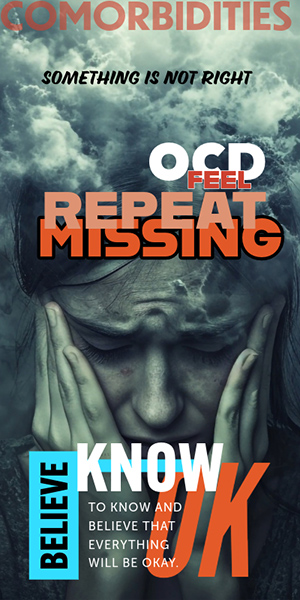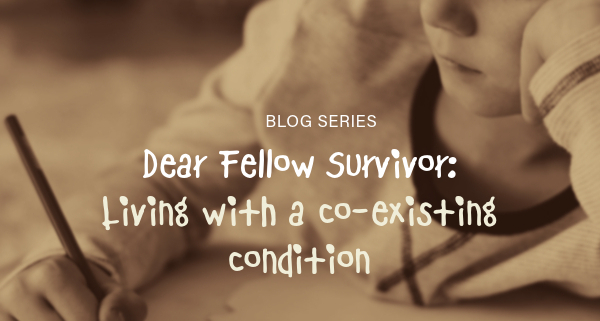Dear Fellow Survivor Blog: Living with a co-existing condition
Summary
This is a blog post series by the author who wrote the devotion series "Dear Survivor". Follow along as he blogs about the background of his experience on his continued journey of healing.
Dear fellow survivor,
I have obsessive-compulsive disorder (OCD). You probably have heard of it. Many people who don’t suffer from OCD think that people with OCD like to keep their closets and bookshelves really organized or that they tend to wash their hands more than they need to. But struggling with OCD involves much more than that. Let me try to explain it to you.
My mind tells me that I’m missing something. It could be anything. Most of the time, I have no idea what I could be missing. But my mind yells at me, “You’re missing something! Something is terribly wrong! Something horrible will happen if you don’t figure out what you’re missing and do something about it!”
People without OCD can tell their minds, “No, I’m not missing anything. Nothing bad will happen. Everything is OK.” And that’s that. But my mind won’t allow me to do that. The sense of unease, the feeling that something bad will happen if I don’t figure out what I’m missing and do something about it, is so strong that I cannot let it go. The thought goes around and around and around and around in my mind, gaining strength with each revolution. That’s the obsession part.
Then comes the compulsion. I MUST do something to make things better. For me, that often involves checking things. I’ll go over my to-do list 4 or 8 or 16, or 32 times (or more—but it must be a multiple of 4). When I write something on the grocery list, I must check it several times to make sure I’ve actually written it there. The problem is that even after I do what I feel compelled to do, I don’t really feel any better. My mind still is telling me that something’s wrong. There still is something I’m missing, something I need to do to make things OK. And so, the whole cycle just keeps on going.
The reason I’m telling you about my OCD today is because my OCD (which existed even before I experienced abuse) has complicated my healing from the abuse I experienced. In a previous post (Painful Puzzle Pieces), I told you about the lie that held my mind prisoner from the time of the abuse until just recently. Several of the steps in my healing journey involved being assured by various people (and by my measurements) that the part of my body that I was concerned about was completely normal. You might think that the testimony of my roommate, my wife, and the ruler would be enough to put that lie to rest in my mind.
Nope. My OCD would not let go of it. I had all the facts. I had people I trusted telling me the truth. But my mind was constantly screaming, “You’re missing something! There’s some piece of information out there that might contradict what these people are telling you! You need to figure out what you’re missing to be ABSOLUTELY SURE that what they say is true.”
And so I would compulsively ask my roommate and my wife the same question over and over and over again. I would compulsively measure myself over and over and over again. I would compulsively repeat to myself what I KNEW was true but couldn’t actually BELIEVE was true over and over and over again. I couldn’t stop because no matter how much I did what my mind told me I needed to do, I never felt any better. My mind could not let go.
Mental health professionals have a word for multiple mental health issues happening at the same time. They call them comorbidities. For me, my OCD is a comorbidity along with the other effects of the abuse I experienced. It preceded the abuse, but it played into how my mind dealt with the abuse and has, in many ways, made my recovery more difficult. Learning to deal with my OCD is another piece of my healing puzzle.
I am happy to report that with the help of my therapist, I am making strides in that direction. I am learning ways to quiet my mind and KNOW that everything is OK even when I don’t FEEL as if everything is OK. When the lie asserts itself in my mind, I now am able (most of the time) to deal with it quickly without going over and over and over it my mind.
The truths I KNOW now are things I also BELIEVE. And I can rest in their reality, even if my mind is telling me that something’s not right.
My OCD existed before I experienced abuse. But very often, comorbidities arise directly out of the abuse people experience. Studies have shown that survivors of childhood sexual abuse are more likely than those who don’t experience abuse to develop anxiety disorders, depression, eating disorders, post-traumatic stress disorder, sleep disorders, and suicidal ideation. Childhood sexual abuse can even contribute to feelings of gender dysphoria in some survivors.

I’m sure this is not surprising to you because you are probably experiencing some of the issues I listed. Perhaps you feel anxious in seemingly safe situations for reasons that you can’t put your finger on. Perhaps there are days when such a black cloud is weighing down on you that you can’t get out of bed. Perhaps you haven’t had a good night’s sleep in who knows how long. Perhaps you and food are bitter enemies. Perhaps, like me, you feel inexplicably uneasy around men, even those who are your closest friends. Perhaps you have concluded that if being a woman means being abused, you don’t want to be a woman anymore. Or perhaps the thought has entered your mind that your life just isn’t worth living anymore, and you really don’t see why you should go on.
These comorbidities can make your healing from the abuse you experienced more complicated. But they do NOT need to keep you from healing. Just as finding ways to deal with my OCD is a part of my healing puzzle, identifying and finding treatment for your comorbidities will probably be a part of your healing puzzle. However, this is NOT a part of your healing puzzle that you will want to tackle alone. To identify and receive treatment for any co-existing mental health issues that you are experiencing, you will want to seek the help of a mental health professional, such as a therapist, psychologist, or psychiatrist. They will have the expertise to help you identify what is going on and work to find ways to help you heal.
You may be reluctant to seek the help of a mental health professional. Perhaps you’re afraid of the stigma that portions of our culture unfortunately still have against those who struggle with mental health issues. Or perhaps you think that you can deal with this all by yourself, that it’s not real, that it’s all in your head. Well, yes, it’s in your head because your brain is in your head. But your brain is an organ of your body, too. If you had a problem with your heart, would you avoid the heart doctor? If you had a broken leg, would you avoid the orthopedist? So, if your brain is struggling, why would you want to avoid the doctor who can help your brain?
You may still wonder if this is a problem you need to see a doctor about. Isn’t it a spiritual problem? Won’t it go away if you pray hard enough? Isn’t this happening because your faith is weak? No. Mental illness is an illness. It is not a spiritual problem. There may be spiritual aspects to it, which is why your pastor will be helpful as you deal with this. But just as your pastor can’t perform the surgery necessary to unblock one of your arteries or set a broken bone, your pastor can’t diagnose or treat a mental illness. For that, you need the expertise of someone who is trained to diagnose and treat mental illness. Again, your brain is an organ of your body.
Don’t treat it as if it’s not.
My dear fellow survivor, I know what it is to struggle with mental health issues that just don’t seem to make sense. I know what it is to feel as if admitting that you have a mental health issue will make everyone look at you as if you’re from another planet. But I also know what it is to receive help from mental health professionals for my mental health issues and what it is to find relief. I want that for you, too.
If you are struggling with anxiety, if you are depressed, if you are dealing with any mental health issue at all, don’t be afraid to seek the help of a mental health professional. Doing so is NOT a sign of weakness. Instead, it is a display of tremendous courage and strength. You are taking another step to put another piece of your healing puzzle in place as that portrait of you as God’s dearly loved child takes shape before your eyes.
In Christ,
Your Brother Survivor
- Dear Fellow Survivor Blog: Coming Out into the Real World
- Dear Fellow Survivor Blog: There’s No Google Maps for This
- Dear Fellow Survivor Blog: Living with a co-existing condition
- Dear Fellow Survivor Blog: The Gift of Vulnerability
- Dear Fellow Survivor Blog: Painful Puzzle Pieces
- Dear Fellow Survivor Blog: Leaning on my brothers
- Dear Fellow Survivor Blog: Sharing My Burden
- Dear Fellow Survivor Blog: About Me




